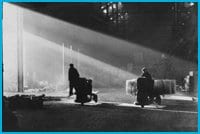
DAZZLING, DEVASTATING. Of Time and the City is a personal history of Davies' hometown of Liverpool.
Terence Davies is among the greatest of British filmmakers. His emotionally enthralling and beautifully stylized ruminations on his proto-queer childhood in the slums of post-war, Catholic Liverpool contain some of the most dazzling, devastating images put to celluloid: The Terence Davies Trilogy from1984 — presented this year by Davies in the Toronto International Film Festival’s Dialogues section in honour of the late festival programmer David Overbey — Distant Voice, Still Lives from 1988 and A Long Day Closes from 1992 are transcendent resurrections of a past marked by both anguish and joy.
After making only two films, The Neon Bible and The House of Mirth in the past 15 years (in 1995 and 2000, respectively) — both less personal than his earlier work — he has returned with his first-ever documentary which, appropriately enough, offers a poetic and intimate look at the city of Liverpool beginning in 1945 (the year of his birth) as seen through reams of compelling archival film footage and the director’s own lyrical, impassioned narration.
Haunted by memory, the richly textured Of Time and the City serves as a map of sorts for Davies’ earlier work. Through newsreels and other documentary footage, it shows us scenes of Liverpool as it was — and in some cases as it exists today — rather than through his mind’s eye. The black-and-white footage has an almost irresistible attraction, promising as it does a glimpse into a lost world. Even when the film moves to colour, its melancholic tone remains.
The elegance of Davies’ vision is heavily influenced by his gluttonous childhood cinephilia: As one critic noted, it looked like he went to films like he went to church. “It was almost a religious thing,” Davies admits. The movie theatre was a place of devotion, and much of his childhood was spent in the dark, where the opulent aesthetics of the silver screen indelibly branded his brain, redeeming the brutality of his life, the savage treatment at the hands of his father and peers. The look of his early films is heightened, amplified, as if seen through the eyes of the child he was. “The first film I saw at seven was Singin’ in the Rain,” says Davies, recalling the 1952 musical, “which is a wonderful way to be introduced to the movies. I think like a lot of children I absorbed it and didn’t realize I was absorbing that cinema language — because it was like learning another language. [That] style is natural to me, it’s instinctive. A lot of people don’t like it, they think it’s far too slow and far too pseudointellectual but I feel all my films with a great deal of passion and commitment.”
As for the action that unspooled before his eyes, Davies suggests, “it was intense; I actually believed what I saw on the screen. In those days, in the ’50s, of course we didn’t have anything like the kind of information technology we’ve got now, people were a lot more naive. So you went to see something like Young at Heart [in 1954], and although a lot of the street scenes are actually shot on a sound stage we didn’t know that, we thought that was the way America was. We really did. So there was that level of innocence as well as having the innocence of a child.”
Davies never sugarcoats the past to make it palatable. The Liverpool of his childhood is a lost object that can never be regained no matter how strong the hold it exerts on him. Though including many scenes of romping children, Davies feels the documentary expresses “a longing,” he says, “but it’s without, I hope, sentimentality. Nostalgia always makes it rosy or warm and loving. It wasn’t that. There were many things about growing up in Liverpool that were unpleasant, the physical conditions alone were dreadful. I think it’s trying to recreate the past in as vividly a way as possible. I suppose I’m trying to lay all those ghosts to rest; I don’t think I ever shall, they’re too powerful within me. And also between the death of my father when I was just under seven to leaving primary school and going up to secondary school where I was beaten up every day for four years, those four years between seven and 11 were my happiest. I mean I was just ecstatic with happiness, literally ill with happiness.”
Discovering he was gay at age 11 carried with it enormous stigma and self-loathing. “Until 1967 in this country it was a criminal offence, so you grew up feeling criminal, even though you hadn’t done anything,” says Davies. “And I vowed then that that was not going to happen to me. And I became celibate.” In Of Time and the City, Davies tells us how he saw Dirk Bogarde in Basil Dearden’s film Victim (1961) when he was 15, a groundbreaking thriller about wretched homo-sexuals and their victimization by blackmailers.
Of Time and the City’s robust confessional narration contains some of Davies’ poems of the past two decades as well as words borrowed from other writers like Joyce and Shelley. The soundtrack often stands in ironic counterpoint to the images, correcting the lies of history embedded in the newsreels and stressing his feelings of difference from the values of God, Queen and country. The tetchy Davies’ British rasp delivers the narration in a theatrically portentous manner, imprinting his persona — and 60 years of hard-earned life experience — onto images held in common with a wider public. Davies offers a scathing indictment of the Catholic Church — responsible for plaguing him with guilt over his youthful urges (sparked in part by wrestling practice) among other crimes — as well as the “facile monarchy.” He even includes a list of the scores of gifts “Betty and Phil” received from a devoted public still forced to ration food years after the end of World War II.
Davies also focuses on the trains and the ships that trafficked the port city, offering a promise of escape to brighter shores and fuelling the industry whose workers filled up the city’s sprawling, decrepit slums, which Davies calls the worst in Europe. Images of the slums cried out to the director. “What was extraordinary, I didn’t realize how squalid the slums were — and I grew up in one. Seeing that material again was actually quite shocking because when you’re very young and you grow up in one of them you think everywhere’s like that; you don’t see it as being awful.”
Music also plays a key role in the film — with Davies a proud throwback, preferring classical to Liverpool natives the Beatles — as sound memories (“the aural texture”) prove just as potent as visual ones. “I do think in terms of music; I think film is closest to music. They used to say at one time that Britain was the land without music, which wasn’t true. When I was growing up everybody sang and a lot of them had very very good voices too so my childhood was steeped in the radio and people singing, that’s very much part of how my memory works.” Davies’ large family was often gathered around the radio, whether listening to a horse named Quare Times win the 1955 Grand National horse race or laughing at the antics of camp homo caricatures Julian and Sandy on the BBC show Round the Horne.
“Although I had written a rough idea of what I wanted to do, that changed with the material that came in,” says Davies of working with archival footage. “That prompted new ideas about how to develop the film as it went on. It was an organic process, it happened almost of its own accord. Obviously I shaped it and there were things in it that have a deep meaning to me, [but] you have to listen to the material. Content dictates form, and that will tell you how it needs to be assembled.”
Davies has struggled to get his projects financed and he holds considerable rage toward the current British film and television establishment. Innovative visionaries — including some at the British Film Institute’s Production Board, which opened in 1966 and was shut down in 1999 (an act Davies deems “cultural vandalism”) — have been overpowered by peddlers of formulaic pap. “[Of Time and the City] is like a valediction, really. I’m such an old pessimist, I think that I’ll never work again. It’s very difficult to get money in this country. Now here everybody looks to America for validation when we actually should be looking to Europe. Every kind of new orthodoxy that comes along, everybody embraces. You’ve got 25-year-olds who don’t know anything about cinema telling you how to write a script, telling you there’s got to be a climax on page six, and you say, well who says so? In this country the level of arrogance coupled with ignorance is actually quite extraordinary.”
Luckily the reception to the film has been exuberant. “It’s been extraordinary, 70 festivals wanted it, everybody in Cannes said they loved it. I mean I’m still in a daze, to be honest with you. I can’t believe it’s had this kind of response.”

 Why you can trust Xtra
Why you can trust Xtra


